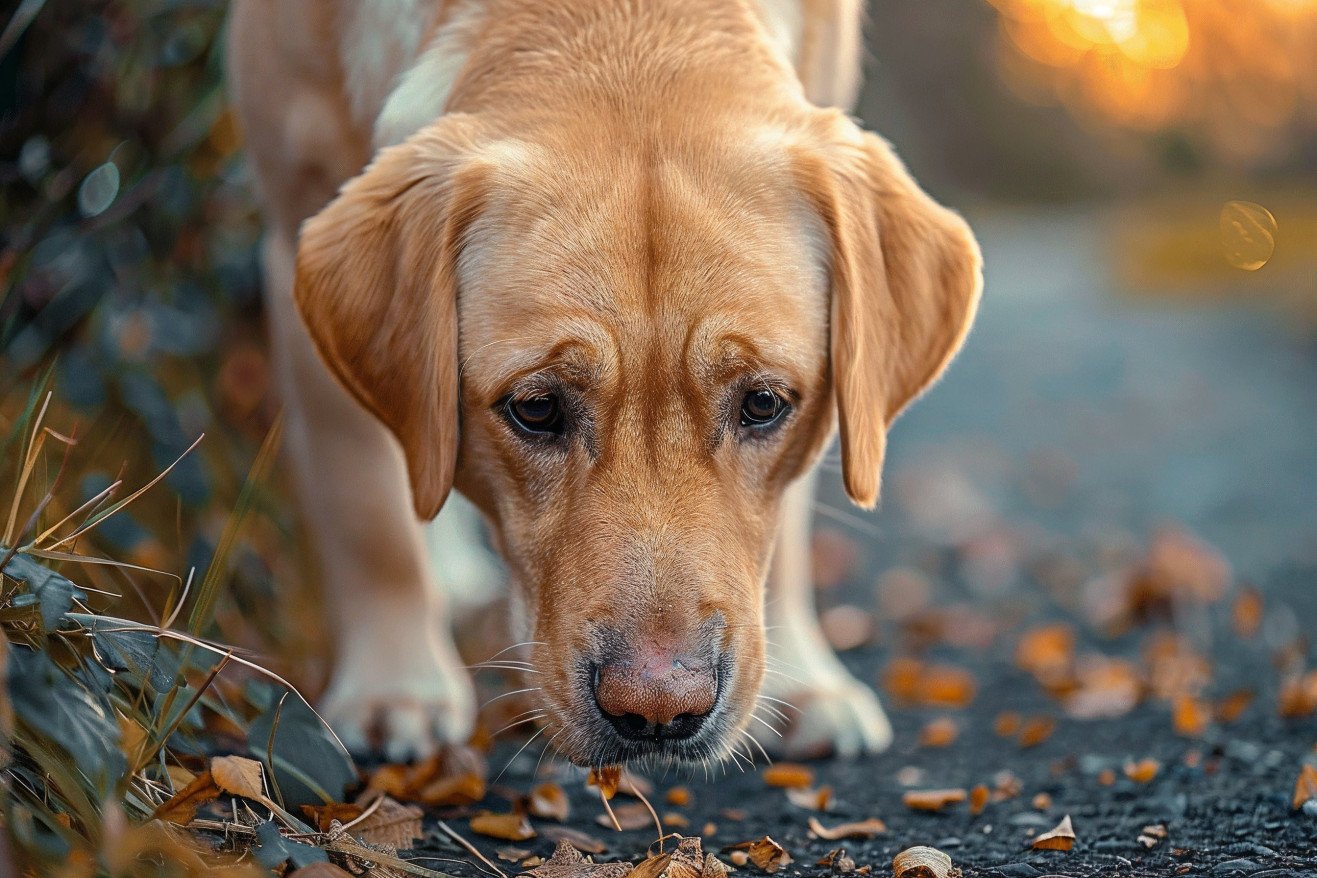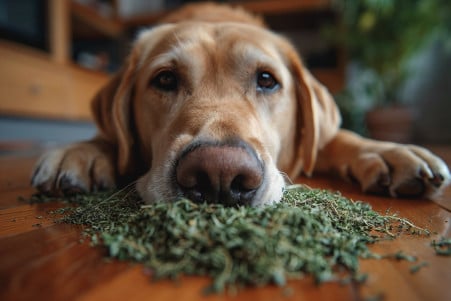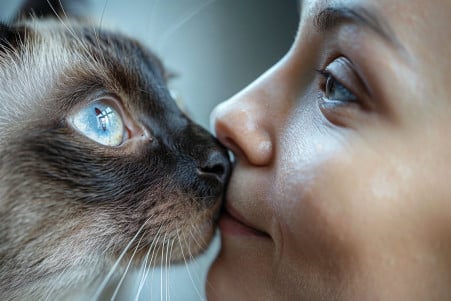Can Dogs Smell Nicotine? What We Know About Drug-Sniffing Dogs
21 March 2024 • Updated 21 March 2024

If you smoke or vape, you may be concerned about drug dogs detecting nicotine when you're pulled over or searched. After all, while nicotine is an addictive substance, it's legal and not nearly as dangerous as many of the other drugs that K-9 units are trained to find. However, drug dogs are trained to detect a variety of substances, including nicotine and tobacco residue. So while the dogs may not be looking for nicotine specifically, they may still find it.
This article will review the research on the impressive olfactory capabilities of drug-detecting dogs, as well as the way they're trained to use their sense of smell to find drugs. This will include research on dogs' ability to detect nicotine and the way their sense of smell is used in law enforcement. By learning about the science behind these skills, you'll be better able to understand what drug dogs are—and aren't—able to do when it comes to helping law enforcement detect illegal drugs.
Can drug dogs smell nicotine?
The Research Behind Canine Olfaction
Dogs have an extraordinary sense of smell that is much more sensitive than humans'. According to a study referenced by ScienceDaily, the sensitivity of a dog's nose is influenced by a number of cognitive factors in addition to their olfactory sensitivity. Dogs have up to 300 million olfactory receptors, while humans have only 6 million, which means they can detect even the smallest amounts of nicotine and tobacco residue.
The anatomical and physiological basis for the dog's superior sense of smell includes a larger olfactory mucosa area, more olfactory receptor neurons, and a vomeronasal system that increases the dog's ability to process chemical signals, as described in a study published in Frontiers in Veterinary Science. In addition, the airflow in a dog's nose is structured in a way that increases the capture of odors.
This extraordinary olfactory sensitivity enables trained detection dogs to differentiate between a wide variety of odors, including the faint scent of human decomposition and even certain types of cancer in humans. Dogs can be trained to detect nicotine and tobacco products with a high degree of accuracy, which makes them especially useful for detecting contraband. Their extraordinary sense of smell is one of the reasons they are so widely used in law enforcement and security.
How Are Drug Detection Dogs Trained to Smell Nicotine?
Training drug detection dogs to smell nicotine involves a number of specific methods that are different from those used to train dogs to detect illegal drugs or explosives. According to 3DK9 Detection, one of the most common ways to train dogs to detect nicotine is to start with a game of hide-and-seek. In this case, the dog is taught to associate the smell of nicotine with a specific object, like a white towel, that is consistently used with the target scent.
Another popular training method is the "shape signal" method, in which the dog is taught a specific command like "sit" or "bow" and is then rewarded when they perform that action after detecting the smell of nicotine. This is done with a variety of scents, which allows the dog to learn to recognize a number of different smells, including legal substances like nicotine, kratom, and Adderall.
That said, there are some unique challenges to training dogs to detect legal substances like nicotine. For example, a Frontiers in Veterinary Science article explains that it's important to make sure that the training aids used are appropriate and that protocols are consistent. In addition, trainers and handlers need to take into account things like the volatility of the nicotine scent and the dog's ability to perform in different real-world situations.
That said, dogs that have been trained to detect nicotine can be very successful, with studies finding that they have an average detection rate of 87.7% in controlled settings. That said, their success rates can drop in more challenging situations, such as when they're asked to search vehicles or new locations. That's why it's important to make sure that these dogs are well-trained and well-deployed so that they can be most effective in helping to address issues related to nicotine.
Legal and Ethical Implications of Using Drug Dogs to Detect Nicotine
The use of drug detection dogs to find nicotine has important legal and ethical implications, especially in places like schools. According to a report from the Office of Justice Programs, the Supreme Court has held that exposing luggage to a trained dog in a public place does not constitute a search under the Fourth Amendment. At the same time, the court has also recognized that people have a higher expectation of privacy in their homes.
This means that the legalities of using nicotine-detecting dogs are complicated. As the SCOTUSblog article explains, the Florida Supreme Court found that using a drug-sniffing dog to detect odors on the front porch of a private home was a search and therefore triggered Fourth Amendment protections. This would seem to mean that the use of these dogs would be more legally questionable in private rather than public settings.
In addition to the legal implications, there are ethical issues related to the use of drug detection dogs to find legal substances like nicotine, especially in schools and with minors. As the Frontiers in Veterinary Science study explains, current drug-sniffing dogs may not be able to consistently differentiate between illegal drugs and legal substances. This calls into question the appropriateness and potential overreach of using these dogs to find nicotine and tobacco products.
It will be important to develop clear policies and protocols for the responsible use of drug detection dogs, especially in places like schools. It will also be important to take a balanced approach that respects people’s privacy while also ensuring that legitimate safety concerns are addressed as schools and law enforcement work to deal with this issue.
Other Ways to Address Student Vaping and Nicotine Use
Although drug detection dogs can help identify the presence of nicotine, there are many limitations and drawbacks to this method, especially in schools. According to the American Lung Association’s research, the INDEPTH program is a more supportive and educational alternative to punitive measures like suspension or citation for student vaping.
INDEPTH is an interactive program that educates students about nicotine addiction and helps them work through exercises that help them identify their personal reasons for using tobacco. Led by trained adults, the program is designed to get to the root of why teens are vaping instead of just punishing them for the behavior. One study showed that 60% of the students who participated in the program said they would be willing to quit using tobacco after completing INDEPTH.
In addition, a study by Stanford Medicine showed that there is a need for more transparent and accurate information about the nicotine content in e-cigarettes. Many adolescents and young adults don’t know how much nicotine is in the e-cigarettes they use, which makes it hard for them to understand the risks and potential for addiction. More accurate information about the products could help students make better decisions.
As schools and communities work to find ways to help students with the issue of vaping, a combination of detection and education will be important. By using programs like INDEPTH and making sure that product information is accurate and transparent, schools can help students with nicotine use in a way that is respectful of their privacy and that will lead to long-term change.
Conclusion: Finding the Right Balance Between Safety and Privacy
The use of drug detection dogs to identify nicotine raises complex legal and ethical considerations, particularly in sensitive settings like schools. While these specially-trained canines can effectively detect the presence of nicotine, their capabilities are limited, and they may not reliably distinguish between legal and illegal substances. It is important to establish policies and procedures that ensure the responsible use of drug detection dogs and that balance the need for safety with the rights of privacy.
In the end, a combination of alternative methods and strategies with traditional detection techniques will be needed to effectively address the issue of student vaping and nicotine use. By using educational programs, improving transparency, and respecting privacy, schools and communities can better help students make lasting changes and support their overall health.


